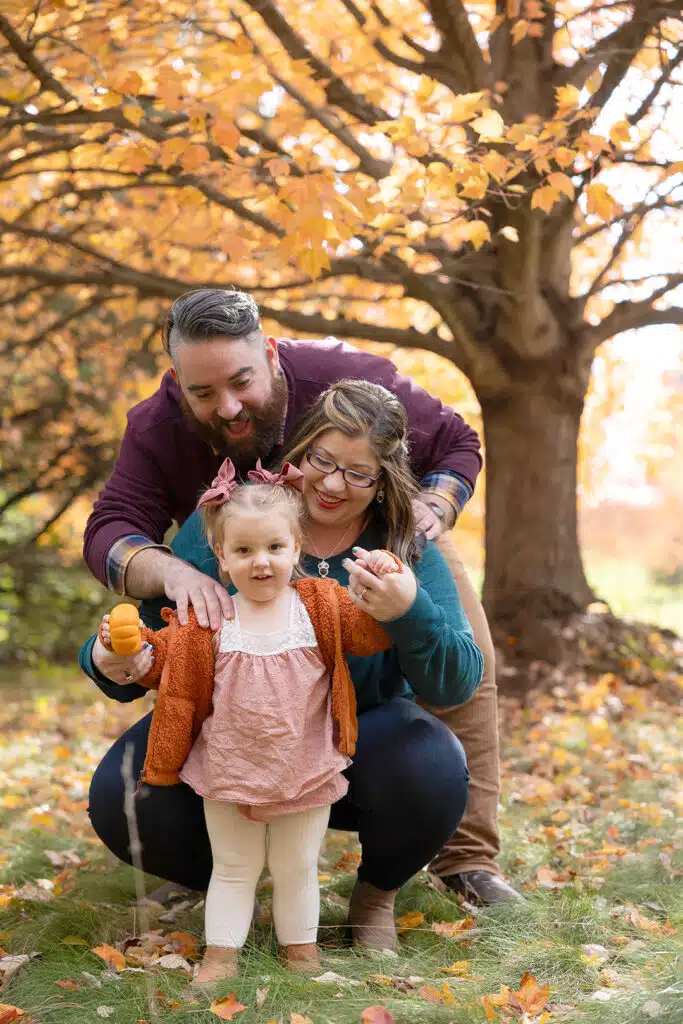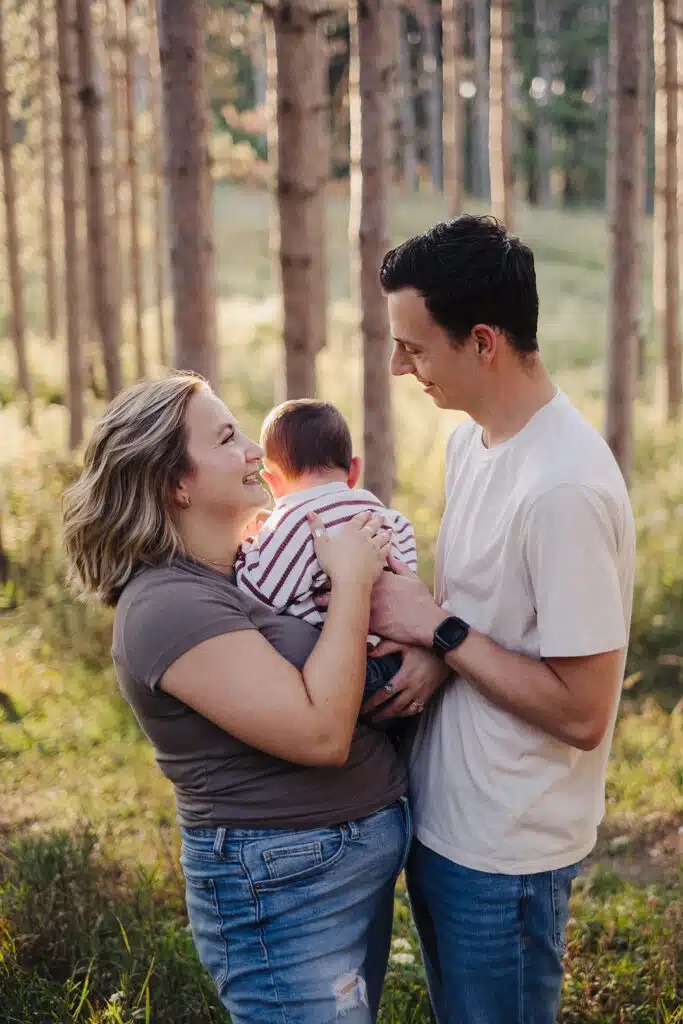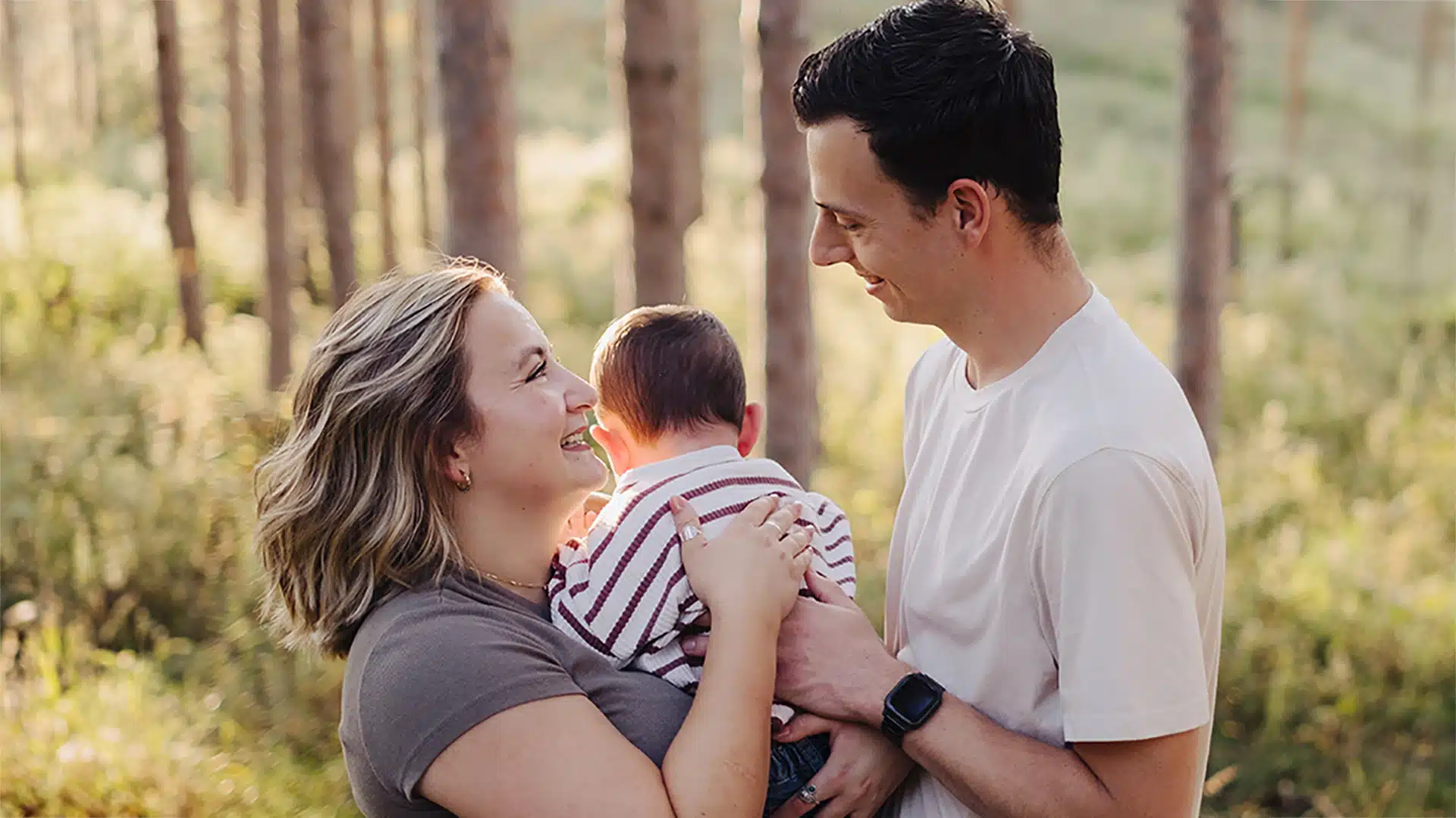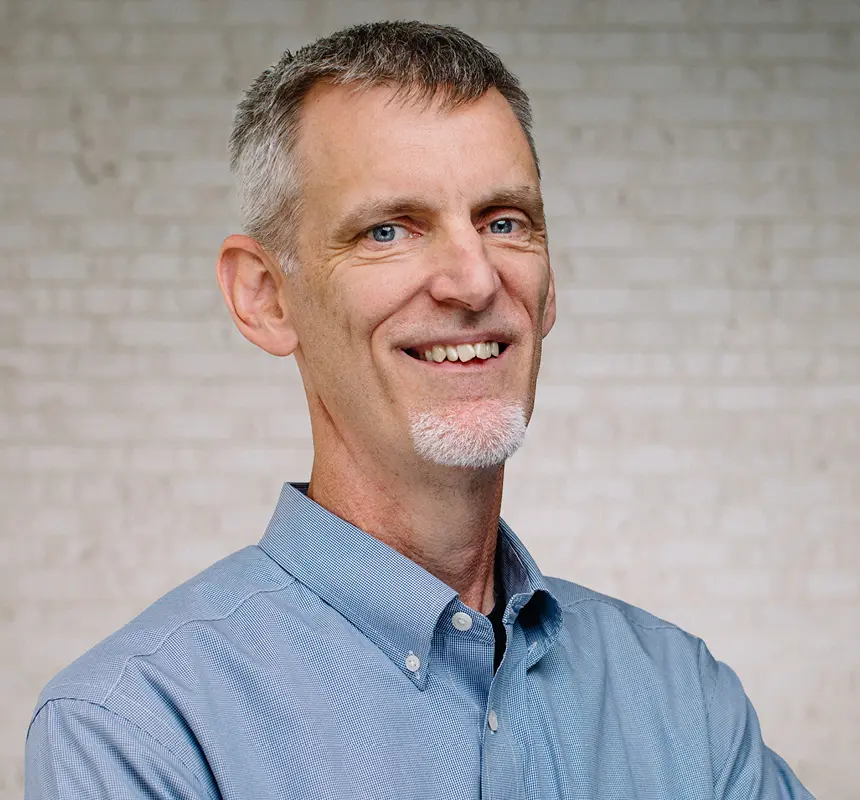What does it take to parent children who have been in the foster system? Tears. Prayers. A support system. Patience. And a new level of trust in God.
We spoke with two First Free couples who have been foster parents and who have adopted children they had been fostering. Alex and Natalie Hanna adopted their daughter, Adelyn, in 2023; Andrew and Abby Finley adopted their son, Aspen, last month.
Both couples emphasize — strongly — that couples should not become foster parents just because they’re looking for a less-expensive way to adopt. The goal of foster care is for families to be reunited. Adopting a foster child means something in that process has gone very, very wrong. But the hard truth is that less than half of foster kids end up being reunited with their birth parents.

The Hannas’ story
Alex and Natalie got licensed as foster parents in 2021. Two months in, they began caring for Adelyn.
“There was something about Addi from the minute she came to us,” Natalie says. “We fell hard for her. She bonded right away. And it was just something special.”
They hoped to adopt a child—maybe Adelyn—but they also learned quickly in the foster care system that anything can happen. They were willing to give other types of care, including respite – giving a short break to the child’s full-time foster caregivers.
Over the next two years, they would care for Adelyn and for other children at times, including two girls ages 3 and newborn for seven months last year. The month after those two girls went home, and after many uncertain moments regarding Adelyn’s future, her adoption was finalized.
That day didn’t come without lots of tears, lots of prayer, and relying on a support network of friends and professional contacts. Alex calls their approach “a heavenly humility and patience, at moments when we were both beside ourselves emotionally.”
“Foster parents don’t have a lot of rights,” Natalie adds. “Oftentimes you’re at the mercy of whatever the social worker or the foster care system says. We prayed for a lot of favor with her.”
All the while, they knew anything could happen.
“I thought, if they decide to move her I will be absolutely devastated,” Natalie says. “But I will have known that we did what we were supposed to do. Foster care is not for the faint of heart.”
The foster-care system isn’t always well-understood, either. Someone will make a well-meaning comment to Alex and Natalie like, “She’s so lucky to have you. Isn’t it great?”
“And we’re like, ‘No, it’s really not,’” Natalie says. “Because everything about foster care is traumatic. In order for a child to be in foster care, they have been traumatized. They have been hurt at a very unbelievable level. Your task is to provide that security, that hope.”
“It’s not as tied up in a bow as people would like for it to be. It’s very messy. It’s very confusing a lot of times. Very heartbreaking. While foster care has brought us our greatest joy, it’s also been the most traumatic experience of our married life.”
Surprise connection
One of the children to whom Alex and Natalie gave respite care was an infant boy named Aspen. They first met him when he was three weeks old. As they cared for Aspen, they hoped to adopt him as well, but the timing wasn’t right. When he needed to be moved to another home, the Hannas were already caring for Adelyn and the other two little girls.
“So,” Natalie says, “we were so happy when they told us they found somebody at church.”

The Finleys’ story
During the time the Hannas were learning to navigate the uncertain world of foster parenting, Andrew and Abby Finley were at a low point. Abby had health issues and they made the emotional decision not to have biological children.
“There were times when I would just lie in bed and cry all day,” Abby says. “I would think to myself, How is our marriage going to survive this?”
They considered both foster parenting and traditional adoption, and decided on the latter.
They got licensed in May 2023, waited and prayed for a child. But they also couldn’t stop thinking about foster care. Abby already was volunteering as a Court Appointed Special Advocate, or CASA, and they knew the struggles displaced kids face. So, as they waited for an adoption opportunity last summer, they also applied to be foster caregivers.
Meantime, Andrew needed a car. They shopped a few local dealerships, including Napleton Cadillac. “We didn’t have money for a Cadillac,” Abby laughs. “We just randomly walked in there.” As Andrew test-drove a 2013 Buick and Abby sat in back, they made small talk with the saleswoman. They mentioned that they had just put in their foster-care application.
“Oh,” she said. “I know this kid.”
Aspen was 15 months old and in the foster system. The saleswoman connected the Finleys to Aspen’s temporary foster parents, and they struck up a friendship. Aspen needed to be moved soon. Abby and Andrew started by babysitting him on two weekends. When those went well, they then took custody last August.
“And it’s been wild from there,” Abby says. “I’ve been so skeptical about this whole miracle thing my whole life. I’ve experienced my own traumas and miracles just didn’t happen.”
The Finleys knew enough about foster care that they weren’t thinking long-term. They also had learned enough of Aspen’s story to know it was severe — “the most horrific thing I had ever heard of in my life,” Abby says.
“We knew that it was likely going toward adoption,” Andrew adds. “It was where we wanted it to go ultimately, but getting into it we wanted to focus on reunification and doing what was best for Aspen.”
The day after Abby and Andrew took custody of Aspen, a judge changed his case goal from reunification with his birth family to adoption.
“He went through a lot with foster care but he has constantly chosen joy,” Andrew says. “When he came to our house the first time, we were worried that he was going to struggle to attach, or that he had experienced so much trauma that it would be hard for him. But he has constantly been a cheerful kid.”
Not that anything was normal. At 15 months, Aspen wasn’t walking, talking or even crying. In his first year of life, he was hungry a lot. Just before meal times still can be hard, because he starts feeling that hunger and it triggers memories and emotions.
“He had so much trauma that he was just a shell,” Abby says. “No one really talks to you about trauma-informed parenting. That was a huge curve to hear everything he had endured in the foster care system. And then figuring out, how do you parent in that? How do you show the love of Christ in that? How do you meet him where he is?
“So knowing his story helps inform us, but it also hurts my heart. I worry, is it too much to overcome?”
As with the Hannas, a supportive network has meant everything to the Finleys. Aspen’s visit for that first weekend of babysitting came with very little lead time. When Abby and Andrew shared the news with family and with their life group, they had a crib … but not much else.
At work that Friday, Andrew’s phone was blowing up.
“I kept getting texts from Abby, who was home that day,” he says. “One of our life group members dropped off toys and monitors. Families dropped things off. I remember walking in the front door and there were just boxes and boxes of stuff. It was really cool to see that God had provided for us through our community of people.”
Fast-forward to Spring 2024. Aspen’s case moved more quickly than his case workers had ever seen. Just six months after the Finleys took custody of him, they had a court date. On a happy Tuesday in March, with family and friends present in the courtroom, the adoption was finalized.
“At times it can be easy to fall into the trap of, Aspen is ours. He’s mine,” Andrew says. “But I have to remind myself often that Aspen is God’s. And God lets us be a part of his story.”
Kids at risk
The need doesn’t stop with Aspen or Adelyn, of course. There’s a serious shortage of foster caregivers both in Illinois and the nation. Abby and Andrew spoke with a caseworker recently who told them they had a baby sitting in their offices for hours one day because they couldn’t find a foster home. At 12 months old, the little boy was homeless.
“The Lord desires families to be restored,” Abby says. “And that’s what we desire. We know that Aspen is coming out of this with us, but he’s had to lose so much to be adopted. And I wish that wasn’t his story.
“The church needs to be a part of this system,” she adds. “The DCFS system is in so many ways so, so broken, and exposes kids to things that they shouldn’t be, and puts them at risk for educational struggles, being incarcerated. The data on it is insane. It just reminds me how crucial it is that the church is a part of this conversation. Aspen needs a support community outside of us, and the church has given him that.”





Thank you for writing this. The number of children in situations like this is growing, not shrinking. Quite a few of us have been fostering/adopting, but the need is huge. God calls us to places that many consider crazy. But seeing a life transformed – from where it could have been – is a path only He could have drawn.
This was an amazing story. As the mother of an adopted child and the grandmother of three grandchildren, it really spoke to my heart. I also have five more adopted children in my close extended family. Adoption has enriched our family in many ways.
I forgot a word —- three adopted grandchildren
My daughter and son-in-law’s experience with foster care and my granddaughter Addi, herself, are reasons I chose to become involved with Winnebago County CASA.
Thanks for these great comments. One of the common knocks against the pro-life community is that they only care about the child before he/she is born. The church has a great chance to prove that criticism wrong. Foster care is one huge opportunity to be the hands and feet of Jesus in our community.